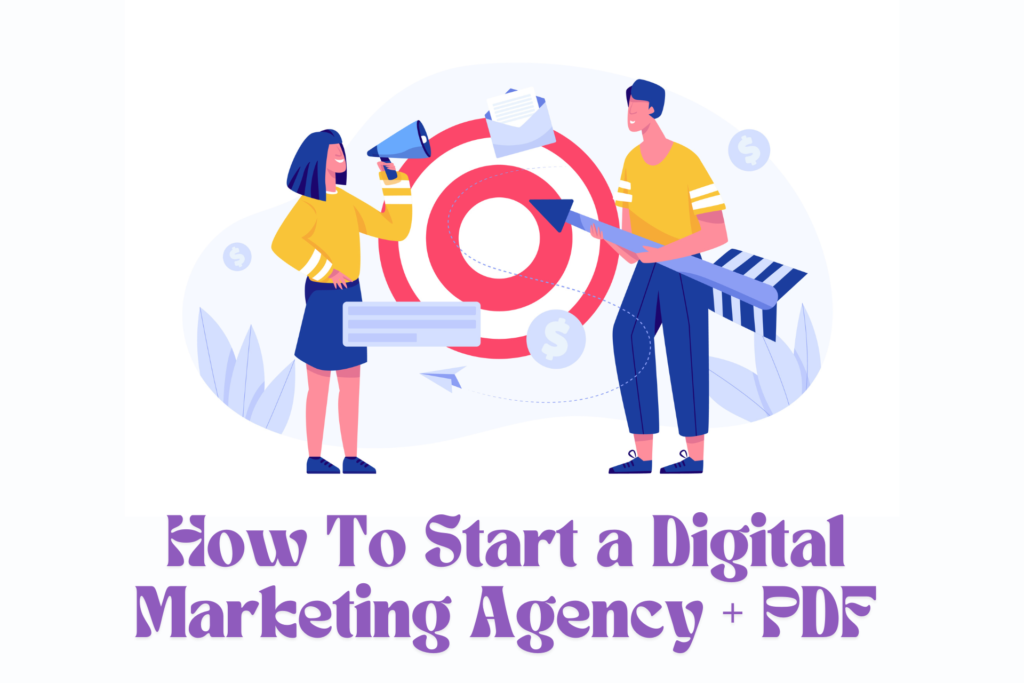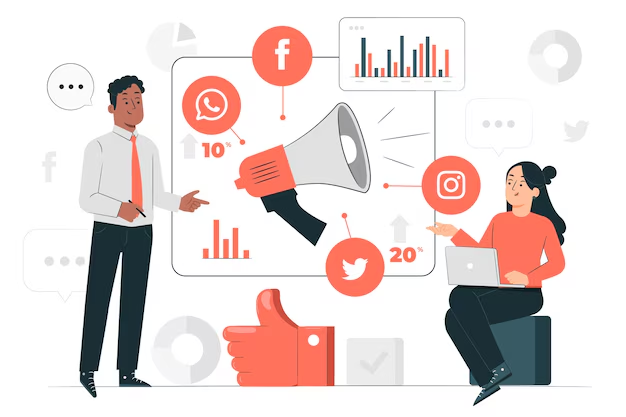In this article we will talk about How To Start a Digital Marketing Agency .
How to Start a Digital Marketing Agency – Quick Guide
-
- Identify Your Niche: Focus on a specific industry or service to stand out and target your ideal clients more effectively.
-
- Develop a Business Plan: Outline your services, pricing, target market, and growth strategy.
-
- Build Your Brand: Create a professional website and social media profiles to showcase your expertise and attract clients.
-
- Assemble Your Team: Hire skilled professionals or freelancers to cover essential digital marketing areas like SEO, PPC, content creation, and social media management.
-
- Set Up Essential Tools: Invest in digital marketing tools and software for analytics, project management, and customer relationship management (CRM).
-
- Market Your Agency: Use your digital marketing skills to promote your business through content marketing, social media, and networking.
-
- Acquire Clients: Start with small businesses or freelance projects to build your portfolio and gain testimonials.
-
- Deliver Results: Focus on providing measurable results to clients through effective and data-driven marketing strategies.
-
- Scale Your Business: Continuously refine your services, hire more staff, and expand your client base to grow your agency.

What Is a Digital Marketing Agency?
A digital marketing agency is a business that provides a wide range of online marketing services to help companies promote their products and services through digital channels. These services often include search engine optimization (SEO), social media marketing, pay-per-click (PPC) advertising, content marketing, email marketing, and web design and development. The goal of a digital marketing agency is to increase a client’s online presence, drive traffic to their website, and ultimately boost sales and brand awareness. By leveraging data analytics and various digital tools, these agencies create targeted marketing campaigns that deliver measurable results.
Is Launching a Digital Marketing Agency a Good Idea?
Starting a digital marketing agency can be an excellent business venture due to the growing reliance on digital platforms for marketing and advertising. With businesses of all sizes seeking to enhance their online presence and reach a broader audience, the demand for digital marketing services is substantial and continues to rise. Additionally, the initial investment required to start a digital marketing agency is relatively low compared to traditional businesses, as most of the work can be done remotely with a computer and internet connection. However, success in this industry requires a strong understanding of digital marketing strategies, the ability to adapt to rapidly changing technologies, and a commitment to delivering value to clients. With dedication and the right skill set, a digital marketing agency can be a highly profitable and scalable business.
Which Kinds of Digital Marketing Companies Are You Able to Launch?
There are several types of digital marketing agencies you can start, depending on your skills, interests, and target market:
Full-Service Digital Agency: Offers a comprehensive range of digital marketing services, including SEO, PPC advertising, social media management, content marketing, web design, and more.
Specialized Agency: Focuses on specific areas such as SEO agencies, social media marketing agencies, content marketing agencies, PPC agencies, or web development agencies.
-
- Niche Agency: Targets a particular industry or demographic, such as healthcare, e-commerce, fashion, tech startups, or local businesses.
-
- Consulting Agency: Provides strategic advice and consulting services rather than execution, helping clients develop digital marketing strategies and plans.
What Kind of Digital Agency Should You Start?
Choose a digital agency type based on your expertise, market demand, and competition in your area. Consider your strengths and passion for specific digital marketing disciplines to differentiate yourself in the market effectively.
Creating a Comprehensive Business Plan
A comprehensive business plan for your digital marketing agency should include:
-
- Executive Summary: Overview of your agency, mission statement, and goals.
-
- Market Analysis: Research target, market, industry trends, and competitor analysis.
-
- Services Offered: Detail your digital marketing services, pricing, and value proposition.
-
- Marketing Strategy: How you plan to attract and retain clients, including your time and your digital marketing efforts.
-
- Operational Plan: Logistics of running your agency, including staffing, technology, and workflow.
-
- Financial Plan: Budget, revenue projections, expenses, and break-even analysis.
How Do Digital Marketing Agencies Make Money?
Digital marketing agencies typically make money through several revenue streams:
-
- Service Fees: Charging clients for specific digital marketing services such as SEO, PPC campaigns, social media management, content creation, and web development.
-
- Retainer Contracts: Securing long-term contracts with clients for ongoing digital marketing services, providing a stable income stream.
-
- Project-Based Fees: Charging a one-time fee for specific projects like website redesigns, marketing campaigns, or consulting services.
-
- Performance-Based Pricing: Earning commissions or bonuses based on achieving specific client goals or metrics.
-
- Additional Services: Upselling additional services like training, workshops, or analytics reporting.
By diversifying revenue streams and delivering measurable results to clients, digital marketing agencies can build a sustainable and profitable business model in the competitive digital landscape.
How to Differentiate Your Digital Marketing Agency in a Crowded Market
In a saturated digital marketing landscape, differentiation is crucial for standing out and attracting clients:
-
- Specialize: Focus on a niche market or industry where you have deep expertise and can deliver tailored solutions.
-
- Showcase Results: Highlight case studies, client testimonials, and measurable outcomes to demonstrate your effectiveness.
-
- Innovative Strategies: Stay updated with the latest trends and technologies in digital marketing to offer cutting-edge strategies.
-
- Personalized Approach: Provide customized solutions that meet the unique needs and goals of each client.
-
- Excellent Customer Service: Build strong relationships with clients through responsive communication and proactive support.
-
- Thought Leadership: Establish yourself and your team as industry thought leaders through blogs, webinars, and speaking engagements.
-
- Transparency: Be transparent about your processes, pricing, and results to build trust and credibility.
-
- Collaborative Partnerships: Form alliances with complementary businesses or influencers to expand your reach and capabilities.
-
- Continuous Improvement: Regularly evaluate and optimize your strategies based on data and feedback to ensure ongoing success.
9 Reasons Why Digital Marketing Agencies Are So Valuable
Digital marketing agencies provide immense value to businesses of all sizes:
-
- Expertise: Specialized knowledge and skills in various digital marketing disciplines.
-
- Cost-Effective: Delivering high ROI compared to traditional marketing methods.
-
- Targeted Reach: Precision targeting of specific audiences based on demographics, interests, and behaviors.
-
- Measurable Results: Ability to track and analyze campaign performance in real-time real-time Moz
-
- Scalability: Adjusting strategies and budgets to accommodate business growth or seasonal demands.
-
- Creative Campaigns: Developing innovative and engaging content that resonates with target audiences.
-
- Brand Awareness: Increasing visibility and recognition across digital platforms.
-
- Customer Engagement: Enhancing interaction and fostering relationships with current and potential customers.
-
- Adaptability: Rapid adaptation to changes in algorithms, trends, and consumer preferences to maintain effectiveness.
By leveraging these strengths, digital marketing agencies help businesses thrive in competitive markets and achieve their growth objectives efficiently.
I Do Not Have Any Experience But Want to Launch a Digital Marketing Agency.
Yes, you can start a digital marketing agency without prior experience, but it’s essential to acquire the necessary knowledge and skills through self-study, courses, or working with mentors. Begin by focusing on one area of digital marketing, such as social media management or content creation, and gradually expand your expertise as you gain confidence and experience. Building a strong network, staying updated with industry trends, and delivering results to clients will be crucial in establishing credibility and growing your agency.
How To Establish A Digital Marketing Agency in 7 Easy Steps
-
- Educate Yourself: Learn the fundamentals of digital marketing through online courses, tutorials, and practical experience.
-
- Choose Your Niche: Identify a specific industry or service area where you can provide value and stand out from competitors.
-
- Develop a Business Plan: Outline your agency’s goals, target market, services offered, pricing, and marketing strategies.
-
- Build Your Online Presence: Create a professional website, social media profiles, and portfolio showcasing your skills and previous work.
-
- Acquire Clients: Start with small projects or offer services at discounted rates to build a client base and gain testimonials.
-
- Deliver Results: Focus on delivering measurable results to clients, which can lead to referrals and repeat business.
-
- Scale Your Agency: Expand your services, hire additional team members, and invest in tools and technology to grow your agency’s capabilities.
The tools required to Manage a Digital Marketing Firm
Running a digital marketing agency requires essential tools to streamline processes and deliver effective campaigns:
-
- Analytics Tools: Google Analytics, Adobe Analytics, or similar tools for tracking website traffic, user behavior, and campaign performance.
-
- SEO Tools: SEMrush, Ahrefs, and Moz for keyword research, competitor analysis, and SEO audits.
-
- Social Media Management: Buffer, Hootsuite, or Sprout Social for scheduling posts, monitoring engagement, and analyzing social media metrics.
-
- Email Marketing Platforms: Mailchimp, Constant Contact, or HubSpot for managing email campaigns, subscriber lists, and automation.
-
- Content Management Systems (CMS): WordPress, Drupal, or Joomla for building and managing client websites and content.
-
- Project Management Tools: Asana, Trello, or Monday.com for organizing tasks, tracking projects, and collaborating with team members and clients.
-
- CRM Software: Salesforce, HubSpot CRM, or Zoho CRM for managing client relationships, sales pipelines, and customer interactions.
-
- Design Tools: Adobe Creative Cloud (Photoshop, Illustrator), Canva, or Piktochart for creating graphics, infographics, and visual content.
Investing in these tools and mastering their use will enhance efficiency, productivity, and the quality of services you offer, ultimately contributing to the success and growth of your digital marketing agency.
Crafting Effective Marketing and Sales Strategies
Crafting effective marketing and sales strategies for your digital marketing agency involves several key steps to attract and retain clients:
-
- Target Audience Identification: Clearly define your target audience based on demographics, interests, and pain points. Make sure your strategy and messaging speak to their needs.
-
- Value Proposition Development: Clearly articulate what sets your agency apart from competitors. Highlight your unique strengths, expertise, and the benefits clients will gain from working with you.
-
- Multi-Channel Marketing: Utilize a mix of digital channels such as SEO, PPC advertising, social media marketing, email campaigns, content marketing, and networking to reach your target audience effectively.
-
- Content Strategy: Develop valuable and relevant content that educates, informs, and engages your audience. This can include blog posts, videos, webinars, case studies, and whitepapers.
-
- Lead Generation: Implement strategies to generate leads such as gated content, landing pages, lead magnets, and call-to-actions (CTAs) that encourage conversions.
-
- Sales Funnel Optimization: Create a structured sales funnel that guides potential clients from awareness to consideration and conversion. Use tools like marketing automation and CRM systems to nurture leads and track interactions.
-
- Client Relationship Management: Focus on building strong relationships with clients through personalized communication, exceptional service, and ongoing support.
-
- Performance Monitoring and Optimization: Continuously monitor the performance of your marketing and sales efforts. Analyze metrics such as website traffic, conversion rates, lead acquisition costs, and customer lifetime value. To boost ROI and adjust strategy, use data-driven insights.
-
- Feedback and Iteration: Gather feedback from clients and prospects to understand their needs and challenges better. Use this feedback to iterate and optimize your marketing and sales strategies continuously.
How to Measure Success and ROI for Your Digital Marketing Campaigns
Measuring success and ROI for digital marketing campaigns involves defining clear objectives and using appropriate metrics to track performance:
-
- Define Objectives: Set specific, measurable, achievable, relevant, and time-bound (SMART) goals for each campaign. Objectives may include increasing website traffic, generating leads, improving conversion rates, or enhancing brand awareness.
-
- Key Performance Indicators (KPIs): Identify relevant KPIs based on your campaign objectives. Common KPIs include:
-
- Traffic Metrics: Website visits, page views, bounce rate.
-
- Conversion Metrics: Conversion rate, lead acquisition cost (LAC), cost per acquisition (CPA).
-
- Engagement Metrics: Click-through rate (CTR), social media engagement (likes, shares, comments), email open rates.
-
- Revenue Metrics: Return on investment (ROI), customer lifetime value (CLV), revenue generated.
-
- Key Performance Indicators (KPIs): Identify relevant KPIs based on your campaign objectives. Common KPIs include:
-
- Tracking Tools: Use analytics tools such as Google Analytics, social media analytics, and CRM systems to track KPIs and campaign performance in real.
-
- Attribution Modeling: Determine which marketing channels and touchpoints contribute to conversions. Consider first-touch, last-touch, or multi-touch attribution models to understand the customer journey.
-
- ROI Calculation: Calculate ROI by subtracting the campaign costs from the revenue generated and dividing by the campaign costs. ROI = (Revenue – Cost) / Cost * 100%.
-
- Benchmarking: Compare campaign performance against industry benchmarks and past performance to assess effectiveness and identify areas for improvement.
-
- Reporting and Analysis: Prepare comprehensive reports that summarize campaign performance, key insights, and recommendations for future optimizations. Present findings to stakeholders and clients to demonstrate ROI and justify marketing investments.
By implementing these strategies and measuring performance effectively, your digital marketing agency can demonstrate tangible results to clients, optimize campaign effectiveness, and drive continuous improvement in marketing and sales efforts.
The Importance of Continuous Learning and Development in Digital Marketing Agencies
Continuous learning and development are critical for digital marketing agencies to stay competitive and deliver exceptional results to clients:
-
- Adapting to Trends: The digital landscape evolves rapidly. Continuous learning allows agencies to adapt to new trends, technologies, and consumer behaviors.
-
- Improving Skills: Regular training and development programs enhance the skills of team members in areas like SEO, PPC, content marketing, and social media management.
-
- Innovation: Learning fosters innovation by exploring new strategies, tools, and techniques that can differentiate the agency and deliver better outcomes for clients.
-
- Maintaining Relevance: Clients expect agencies to be experts in their field. Continuous learning ensures agencies stay relevant and provide up-to-date solutions.
-
- Client Satisfaction: Well-trained teams are better equipped to meet client expectations, deliver quality work, and provide superior customer service.
-
- Employee Engagement: Investing in learning opportunities demonstrates commitment to employee growth, boosting morale, motivation, and retention.
Staying Updated with Industry Developments
Staying updated with industry developments is crucial for digital marketing agencies to maintain competitiveness and deliver effective strategies:
-
- Industry News and Publications: Regularly read industry blogs, news websites, and publications to stay informed about the latest trends, updates, and best practices.
-
- Attend Conferences and Webinars: Participate in industry events, conferences, and webinars to learn from experts, network with peers, and gain insights into emerging trends.
-
- Join Professional Communities: Engage with digital marketing communities on platforms like LinkedIn, Reddit, and industry-specific forums to discuss trends, ask questions, and share knowledge.
-
- Continuous Training: Provide ongoing training and certifications for team members in areas such as Google Ads, Facebook Ads, SEO tools, and analytics platforms.
-
- Follow Thought Leaders: Follow thought leaders and influencers in the digital marketing space on social media, podcasts, and blogs to learn from their experiences and insights.
-
- Experiment and Test: Allocate time and resources for testing new strategies, tools, and tactics to innovate and stay ahead of competitors.
Scaling Your Digital Marketing Agency
Scaling a digital marketing agency involves strategic planning and execution to grow revenue, expand service offerings, and increase market reach:
-
- Refine Processes: Streamline workflows, automate repetitive tasks, and implement project management tools to improve efficiency as the agency grows.
-
- Expand Service Offerings: Diversify services to meet client needs and capture a broader market. Consider adding new specialties or industry-specific solutions.
-
- Hire and Train Talent: Recruit skilled professionals who complement your existing team and invest in their training and development to maintain high service standards.
-
- Client Acquisition and Retention: Implement targeted marketing strategies, improve client retention through exceptional service, and leverage referrals and testimonials.
-
- Invest in Technology: Upgrade and invest in digital tools and platforms that support agency operations, analytics, and client management.
-
- Partnerships and Alliances: Form strategic partnerships with complementary businesses or agencies to expand service capabilities and reach new markets.
-
- Monitor Performance: Continuously track key performance indicators (KPIs), client satisfaction, and financial metrics to measure success and identify areas for improvement.
Digital marketing agencies can position themselves for sustained growth, profitability, and long-term success in a competitive marketplace by focusing on continuous learning, staying updated with industry developments, and strategically scaling operations.







